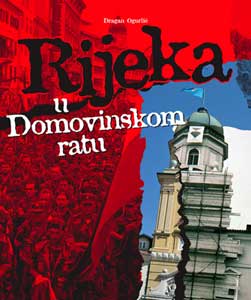
 Rijeka in Rijeka in
Patriotic Defence War
During the year 1991, when the aspiration to a gain
political and constitutional independence of the Republic of
Croatia from the union of Yugoslav republics was realised, a
brutal aggressions of its territory took place.
In
the June of 1991, the armed aggression of the Yugoslav National
Army began in Slovenia, while a similar scenario also threatened
Croatia, where, during the summer, municipalities with the Serb
majority proclaimed the separation and the terror over the
non-Serb inhabitants began.
Already in the July of 1991, eastern Slavonija was attacked,
while single attacks and incidents in other parts of Croatia
deve loped into an
open war of Serbia, the Yugoslav National Army
and rebel Serbs from Croatia and Bosnia and Herzegovina against
the Republic of Croatia. Serb leader Milo�evi� and intellectual
and military elite of Serbia dreamt of defeating the new state
by military operations, in this way wanting to reach the
imaginary border Virovitica-Karlovac-Karlobag, namely, the
border of the so-called Great Serbia. loped into an
open war of Serbia, the Yugoslav National Army
and rebel Serbs from Croatia and Bosnia and Herzegovina against
the Republic of Croatia. Serb leader Milo�evi� and intellectual
and military elite of Serbia dreamt of defeating the new state
by military operations, in this way wanting to reach the
imaginary border Virovitica-Karlovac-Karlobag, namely, the
border of the so-called Great Serbia.
While
the greatest part of Croatian eastern borders was already
involved in war operations, the situation in Rijeka and its
surroundings was seemingly peaceful. However, a nerve-rackingplay was taking place in Rijeka and the entire regional
Association of Municipalities in the summer and autumn of 1991.
Its main characters were the threatening Yugoslav National Army,
cautious politicians who wished to maintain the peace, growing
Croatian underground forces hiding within police forces, and the
population, for a long time unaware of the ac tual dangers and
the war that was going to follow. tual dangers and
the war that was going to follow.
Eventually,
Rijeka gave a huge contribution to the defence of Croatia in the
Patriotic Defence War. Its industry was active throughout the
war, despite the fact that economy suffered from isolation and
although many people were engaged on the frontline. Through
negotiations, the politicians succeeded in arranging a peaceful
separation with the Yugoslav National Army, which withdrew from
Rijeka for good in the December of 1991. Much before that,
thousands of veterans from this region went to Lika in an
organised way, a hundred kilometres away from their home in
order to defend it on that line.
This book faithfully presents the situation in the wartime
Rijeka and the closest front-line in Lika. It is written in a
clear and documented way, in the author and other speakers’
words, most of whom are war commanding officers and the leading
people of Rijeka in 1991. In a detailed manner, the book
describes the preparation, the g rowing of, the
development and
the war operations of the police special forces and the armed
units of the corps of the national guard, the territorial
defence and the civil defence, subsequently of the Croatian
army, war medical corps and general logistics. It also describes
the provision of spiritual care and the giving of shelter to a
great number of displaced persons and war refugees. rowing of, the
development and
the war operations of the police special forces and the armed
units of the corps of the national guard, the territorial
defence and the civil defence, subsequently of the Croatian
army, war medical corps and general logistics. It also describes
the provision of spiritual care and the giving of shelter to a
great number of displaced persons and war refugees.
The enemy was stopped at the cost of many lives lost, on the
150-kilometre long front-line in Lika, in 1991 and 1992. The
most vital part of the population of Rijeka, Primorje, Gorski
kotar and Kvarner islands was engaged in this war. These people
changed their civil daily life for the winter in Lika and the
bloody and pitiless war.
The imperative was to safeguard Lika, as the enemy breakthrough
would have meant to have Croatia split into two parts. In one
moment, in the beginning of 1992, there were four brigades in
Lika from Rijeka, Primorje and Gorski kotar, with single armed
units in other brigades. This book describes their campaign,
which finishes in 1995 with
Oluja, the
liberation operations of the Croatian army and police, when the
enemy was entirely defeated and the sovereignty of the Republic
of Croatia regained in all of its territory.
 Two
hundred and thirty members of the Croatian Army from the area of
Rijeka and Opatija, Hrvatsko Primorje and the islands, as well
as Gorski kotar, laid down their lives in the Patriotic Defence
War, which lasted from the summer of 1991 to the end of 1995.
More than a thousand of them were wounded, while many remained
permanently disabled, nowadays needy of the state and local
government care. Two
hundred and thirty members of the Croatian Army from the area of
Rijeka and Opatija, Hrvatsko Primorje and the islands, as well
as Gorski kotar, laid down their lives in the Patriotic Defence
War, which lasted from the summer of 1991 to the end of 1995.
More than a thousand of them were wounded, while many remained
permanently disabled, nowadays needy of the state and local
government care.
The book Rijeka in
Patriotic Defence War is the
first to praise the local remembrance of the Patriotic Defence
War, lived by ten thousands of veterans on the front-line and in
logistics, not such a long time ago. The memories are still
fresh, while there are many speakers and witnesses. They
constitute the mosaic of a story that wishes to be told in a
perfectly honest way - a story of those heroic times. |













